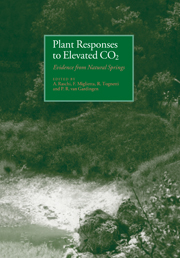Book contents
- Frontmatter
- Contents
- List of contributors
- Preface
- Sites of naturally elevated carbon dioxide
- Migration in the ground of CO2 and other volatile contaminants. Theory and survey
- Levels of CO2 leakage in relation to geology
- CO2 emission in volcanic areas: case histories and hazards
- Controlled degassing of lakes with high CO2 content in Cameroon: an opportunity for ecosystem CO2-enrichment experiments
- Burning coal seams in southern Utah: a natural system for studies of plant responses to elevated CO2
- Long-term effects of enhanced CO2 concentrations on leaf gas exchange: research opportunities using CO2 springs
- Using Icelandic CO2 springs to understand the long-term effects of elevated atmospheric CO2
- Plant CO2 responses in the long term: plants from CO2 springs in Florida and tombs in Egypt
- Acidophilic grass communities of CO2 springs in central Italy: composition, structure and ecology
- Studying morpho-physiological responses of Scirpus lacustris from naturally CO2-enriched environments
- Carbon physiology of Quercus pubescens Wild, growing at the Bossoleto CO2 spring in central Italy
- Preliminary results on dissolved inorganic 13C and 14C content of a CO2-rich mineral spring of Catalonia (NE Spain) and of plants growing in its surroundings
- The impact of elevated CO2 on the growth of Agrostis canina and Plantago major adapted to contrasting CO2 concentrations
- Stomatal numbers in holm oak (Quercus ilex L.) leaves grown in naturally and artificially CO2-enriched environments
- Effects of CO2 on NH4+ assimilation by Cyanidium caldarium, an acidophilic hot springs and hot soils unicellular alga
- Can rising CO2 alleviate oxidative risk for the plant cell? Testing the hypothesis under natural CO2 enrichment
- Increasing concentrations of atmospheric CO2 and decomposition processes in forest ecosystems
- Index
Increasing concentrations of atmospheric CO2 and decomposition processes in forest ecosystems
Published online by Cambridge University Press: 10 February 2010
- Frontmatter
- Contents
- List of contributors
- Preface
- Sites of naturally elevated carbon dioxide
- Migration in the ground of CO2 and other volatile contaminants. Theory and survey
- Levels of CO2 leakage in relation to geology
- CO2 emission in volcanic areas: case histories and hazards
- Controlled degassing of lakes with high CO2 content in Cameroon: an opportunity for ecosystem CO2-enrichment experiments
- Burning coal seams in southern Utah: a natural system for studies of plant responses to elevated CO2
- Long-term effects of enhanced CO2 concentrations on leaf gas exchange: research opportunities using CO2 springs
- Using Icelandic CO2 springs to understand the long-term effects of elevated atmospheric CO2
- Plant CO2 responses in the long term: plants from CO2 springs in Florida and tombs in Egypt
- Acidophilic grass communities of CO2 springs in central Italy: composition, structure and ecology
- Studying morpho-physiological responses of Scirpus lacustris from naturally CO2-enriched environments
- Carbon physiology of Quercus pubescens Wild, growing at the Bossoleto CO2 spring in central Italy
- Preliminary results on dissolved inorganic 13C and 14C content of a CO2-rich mineral spring of Catalonia (NE Spain) and of plants growing in its surroundings
- The impact of elevated CO2 on the growth of Agrostis canina and Plantago major adapted to contrasting CO2 concentrations
- Stomatal numbers in holm oak (Quercus ilex L.) leaves grown in naturally and artificially CO2-enriched environments
- Effects of CO2 on NH4+ assimilation by Cyanidium caldarium, an acidophilic hot springs and hot soils unicellular alga
- Can rising CO2 alleviate oxidative risk for the plant cell? Testing the hypothesis under natural CO2 enrichment
- Increasing concentrations of atmospheric CO2 and decomposition processes in forest ecosystems
- Index
Summary
SUMMARY
The impacts of elevated atmospheric CO2 concentration on decomposition processes are reviewed, with consideration given to both the direct and indirect effects which CO2 may exert on soil processes.
Present work indicates that elevated concentrations of CO2 affect litter decomposition through changes in litter quality.
In particular, elevated CO2 decreases litter N concentrations with a resulting increase in C/N and lignin/N ratios, leading to a slow down in litter decomposition rates.
Such observations are true for both leaf and root litters, and for laboratory as well as field incubations. CO2 treatment does not appear to exert any effect on litter decay rates when there are no measurable changes in leaf chemical composition.
Furthermore, it has been identified that elevated CO2 is unlikely to exert any direct effects on soil biological activity, and that only effects mediated via changes in plants are likely to occur.
Although there is currently debate about the effect which increased C inputs to soils resulting from elevated CO2 may have on the turnover rates of existing soil organic matter, the overall conclusion is that soil C stores are increasing, and will continue to increase, under higher CO2 concentrations.
INTRODUCTION
If accurate predictions of the influence of elevated CO2 on terrestrial carbon (C) balance and on the global C cycle are to be made, then more information is needed about the development of above- and below-ground C stores under different atmospheric CO2 concentrations. The extent to which terrestrial ecosystems are able to ‘buffer’ against rising atmospheric CO2 concentrations by storing more or less C needs to be assessed, together with the changes which are currently occurring.
- Type
- Chapter
- Information
- Plant Responses to Elevated CO2Evidence from Natural Springs, pp. 242 - 267Publisher: Cambridge University PressPrint publication year: 1997
- 3
- Cited by



